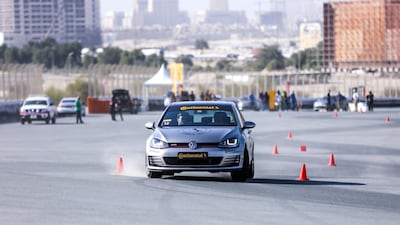Among talk of horsepower, torque, engine sizes and the unstoppable march of autonomous and electric cars, it is sometimes easy to forget that none of this would matter very much without the surfaces that make contact with the road. The importance of tyres is magnified further still in the UAE, where the desert heat relentlessly punishes our cars' rubber most months, then at this time of the year, we are faced with inclement weather that can often result in standing water, flash flooding and dust all over the place.
German brand Continental has taken all of this and more into consideration in launching what it claims is the first full range of tyres designed specifically for the challenges of the Middle East. Its Generation 6 tyres are also manufactured to withstand damage from pot holes, debris and kerb impacts in being conceived to handle all the challenges that the region can throw at them, from Egypt’s busy streets to rural Saudi Arabia, as well as the Emirates’ highways and byways.
Continental is certainly serious about tyres, even though they make up only 26 per cent of its total business. The company tests 250,000 tyres per year for a total of 160 million kilometres.
I don’t have quite that range when I head to Dubai Autodrome to take part in a series of tests of the Generation 6 Tyres, which underwent two years of development and production, but it is an interesting insight into the gains that have been made.
There are 60 different tyres across three lines within the range – ComfortContact 6, UltraContact 6 and MaxContact 6 – aimed at distinct sets of customers. The Comfort tyres, which focus on noise reduction, are meant for smaller cars and city driving, but you don’t come to Dubai’s premier racetrack for that kind of polite behaviour. So naturally we are trying out the Ultra, made for slightly larger cars and with technology that shortens stopping distances, via a handling course in a mini fleet of Volkswagen Golf GTIs; and the high-performance Max, which use adhesive polymers to “stick” to the street, around the main Autodrome circuit in Ford Mustangs.
The Golf exercise involves a timed dash through a slalom of cones, with time penalties added for any knocked over or any gates missed, before screeching to a halt in a marked box – again with your time compromised should you miss the stopping. The UltraContacts certainly stand up well to being thrown around the snaking course, and such is their power to halt the Golf that it is surprisingly difficult not to overbrake at the final stopping area.
___________________
Read more:
Faulty tyres kill eight people in Dubai this year, police say
What to expect from this year’s Dubai International Motor Show
The decoder: Crawl ratio for off-road vehicles
Latest from The National's Motoring section
___________________
My Mustang mosey is slightly more at the mercy of other drivers, with two parades of muscle cars led by a pace pilot – at one point, a straggler at the back of the other pack means that we have to slow to speeds probably not intended to showcase the best of the MaxContacts. But in the corners we are able to approach and exit at something approaching racing speeds, the Continentals feel sure-footed and with minimal tyre squeal.
“During the past two years we were collecting information about the streets and the behaviour of the tyres in the region, and we were seeing that we needed to develop different tyres for this region,” says Ricardo Martins, Continental’s head of marketing Middle East. “All of these tyres were tested here in Dubai. The tyres are more robust than the tyres we are building in Europe. In Europe, everything goes into fuel consumption. Here, the tyres need to resist the impacts of the street.”

